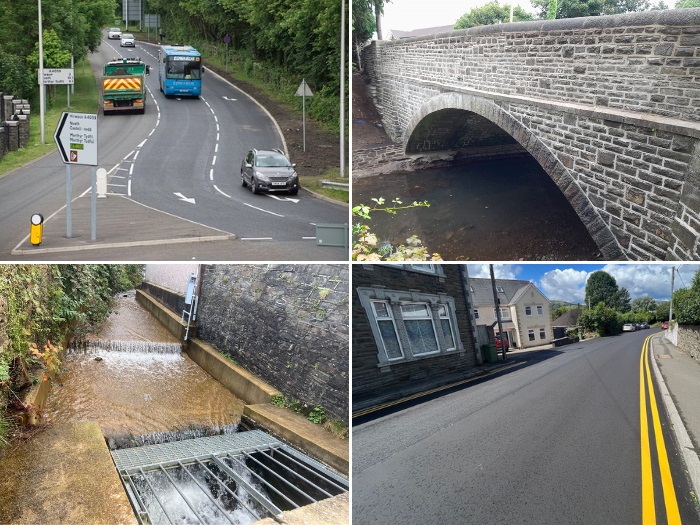Cabinet has agreed the details of a supplementary programme of highways, structures and flood alleviation schemes – to be carried out in the remainder of 2023/24 using funding that was recently allocated to the service.
In September 2023, Cabinet agreed a wider, one-off £7.73m investment for Council priority areas – which also included parks and green spaces, town centres, leisure centres and accommodation for older people. A £4.75m allocation was agreed across highways (£1.5m), flood alleviation (£200,000), structures (£2.5m) and the Making Better Use Programme (£550,000).
A report to the Cabinet meeting on Monday, November 20, set out how this extra funding, which is on top of the ongoing Highways and Transportation Capital Programme for 2023/24, could be used. Officers set out a series of schemes within a new supplementary programme for the remainder of the financial year – and Cabinet agreed with recommendations to approve it.
The £1.5m allocated to highways will be used to deliver 23 road resurfacing schemes (£1.146m) and 16 footway improvement schemes (£304,000), as well as minor patching works where required (£50,000). The road and footway schemes are listed in full within a report to Monday’s Cabinet meeting.
The £200,000 set aside for flood alleviation will help continue to fund ongoing work that has improved the surface water sewer network in many locations. Typical work includes CCTV surveys and cleaning of the network, identifying and carrying out repairs, and improving access arrangements to culverts.
The £2.5m for structures will progress five repair or refurbishment schemes – A4059 Afon Cynon Bridge in Cwmbach, Rheola Bridge in Porth, Glan Road Bridge in Aberdare, Llanwonno Road Railway Bridge in Stanleytown and Glan y Llyn Bridge in Glantaff. Funding is also allocated for preparatory work to various other structures, and retaining wall refurbishments at many locations.
The £550,000 earmarked for the Making Better Use Programme will progress preliminary design and project development for A4059 corridor enhancements – to further improve traffic flow on this artery road through the Cynon Valley.
Councillor Andrew Morgan OBE, Leader of Rhondda Cynon Taf Council and Cabinet Member for Infrastructure and Investment, said: “The extra £4.75m funding for Highways that Cabinet discussed on Monday was recently allocated to the service as part of a wider investment in Council priority areas. Officers have now detailed how this funding will be used in a supplementary programme to be delivered this financial year – on top of the ongoing £27.6m Capital Programme for Highways, Transportation and Strategic Projects.
“The £1.5m funding for roads will expand this year’s programme of resurfacing schemes, adding to the £5.2m Capital Programme allocation for 2023/24. It will include an extra 23 resurfacing schemes and 16 footway improvements. Our road network has now benefitted from 12 years of enhanced investment, contributing to the improved overall condition of our ‘A’, ‘B’ and ‘C’ roads.
“Maintaining highway structures is a huge undertaking, and our increased investment in recent years has reflected the large number that need work – which is often complex in nature. The £4.45m Capital Programme allocation has ensured good progress to date – including Imperial Bridge in Porth which nears completion, and Lanelay Bridge in Talbot Green and Graig Las Bridge in Hendreforgan which are complete. The extra £2.5m funding will be used for five new schemes in Cwmbach, Porth, Aberdare, Stanleytown and Glantaff.
“Finally, the Making Better Use programme has been running for many years to identify lower-cost, higher-value improvements on congested sections of our highway network. This is with the intention of improving traffic flow, easing congestion and improving road safety. In recent years we’ve delivered many effective schemes on the A4059 in the Cynon Valley, and the extra £550,000 funding will help design and develop additional measures across this route.
“I’m pleased that Cabinet has now approved the detail of the supplementary capital programme, and the named schemes can now be progressed.”
While the supplementary programme is earmarked for 2023/24, officers have acknowledged that all new and existing schemes will continue be reviewed on a case-by-case basis – and there will be a degree of flexibility in delivery timescales. This will be based on many factors, including the availability of resources and drawing down of grant funding, all of which will be considered.



